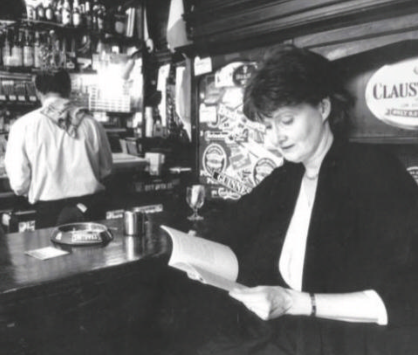But once she was married and the mother of two small daughters, happy if she could jot down just one line or one image, that was not her life. Her days now revolved round cooking, washing up, nappies, feeds; lifting the kettle to the gas stove, setting her skirt over a chair to have it without creases for the morning. They were full of small untidinesses and oversights which assumed huge importance, like the loaf forgotten by the cash register, or washing left wet.
但是一旦伊萬結婚了,成為兩個小女孩的母親,她能草草地寫下一行字或者一個點子就已經很開心了,可那不是她的生活。她的生活現在圍繞著做飯,洗碗,換尿布和喂食;把水壺放到煤氣灶旁,把裙子搭在椅子上,這樣早上就不會有褶皺了。這些事充滿著小的凌亂和疏忽,都很重要,比如把面包忘在收銀臺前面,或者東西沒有洗干。
They were full, too, of hidden satisfactions: a row of cups winking on their saucers, a copper pan well polished, fresh green celery feathers. Much of this was so ordinary that it might have seemed unremarkable. Certainly it was not named in Irish poetry. But ordinariness, "dailiness", was precisely what she wanted to capture. The surfaces of things could barely hold what was under them; just as the small, routine gestures of many couples contained the unspoken steadfastness of love.
它們也充滿了隱藏的滿足:一排在碟子上閃閃發光的杯子,一個擦得很亮的銅鍋,新鮮的綠色芹菜。這些事情中很多都很平常,所以可能看起來不起眼。當然,它不會出現在愛爾蘭詩歌中。但是,伊萬想表現的就是普通的日常生活。事物的表面幾乎無法隱藏它們內部的東西,就像許多情侶的小動作和日常動作一樣,包含著不言而喻的愛的堅定。

Other "women's subjects" needed tackling more forcefully. She had no qualms about that. The whole poetic tradition had to be scrubbed and abraded with the wash stones of resistance. So an anorexic torched her witch-body, its "curves and paps" until, "thin as a rib", she could slip back into Adam again, "as if I had never been away". A menstruating woman confronted the moon, "dulled by it/ thick with it…a water cauled by her light…barren with her blood."
其它“女性的議題”需要更強有力的應對。她對此并沒有感到不安。整個詩歌傳統必須用反抗的磨刀石來擦洗和研磨。一位厭食者點燃了她女巫般的身體,她的“曲線和柔軟”,直到“瘦的像一根肋骨”,她就能再次回到亞當的身體里,“就好像從沒有離開過”。一個來月經的女人面對著月亮,“變得遲鈍/變得愚笨...光傾注在水面上...在空蕩蕩的地方流著血。”
譯文由可可原創,僅供學習交流使用,未經許可請勿轉載。












